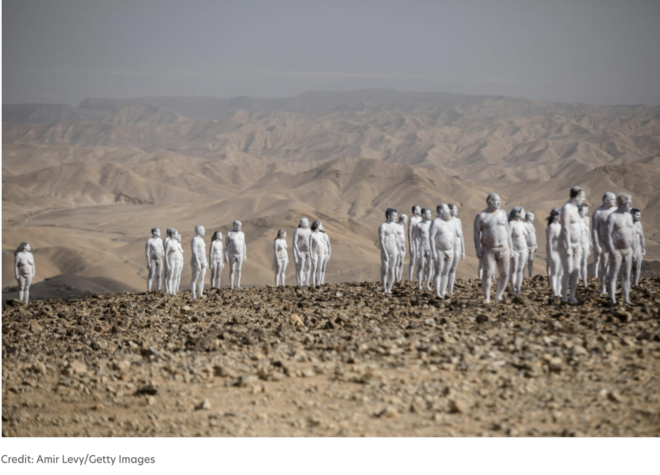The Dead Sea is dying. Lack of natural run-off from the River Jordan, and an ecological disaster created from mineral mining – for fertilizer – has created a situation where the Dead Sea is retreating quickly. The retreat has created an imbalance which results in dangerous sinkholes that can pop up at any time engulfing whole roads or a hotel beachfront.
Imagine creating a garbage dump in the middle of the Grand Canyon or scaling the top of off Mount Everest? In effect that’s what mineral mining is doing at the Dead Sea. And where politics and money can’t intervene Ari Leon Fruchter is hoping art will help. If you read on after the naked pics, you will see how businesses from Canada, Jordan, China and Israel are driving destruction.
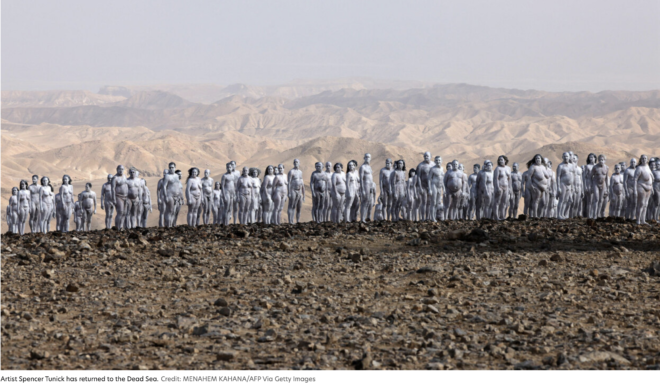
To highlight the beauty of the Dead Sea and to preserve its wonders before it is gone American-Israeli Fruchter invited his New York pal Spencer Tunick to Israel to photograph the Dead Sea in the backdrop of his iconic nude photographs.
The first Spencer photoshoot was 10 years ago and 1,200 Israelis stripped to be part of the moment. Tunick returned in 2016 and once again this week, in a less elaborate shoot, highlighted what we are losing.
“To immerse yourself in the preservation of a natural cause with one’s art is a very rewarding experience, but it also comes with the sad realization that often man-made disasters are hard to stop,” Tunick says.
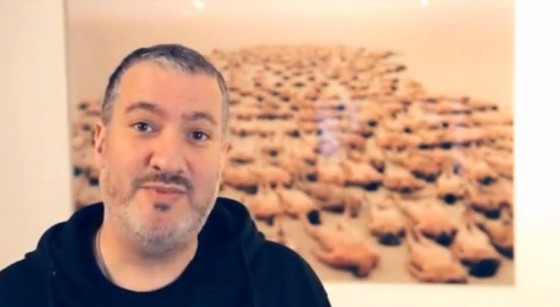
“This does not mean one should not try to make a difference. With my works at the Dead Sea, I attempt to poetically visually create pushback against the loss of a natural wonder of the world. The works touch on the hope that early warnings of environmental catastrophe will spark quicker responses from people. Change does not happen in a vacuum, sometimes it takes art to spread the word.”
Fruchter, who aims to build a real-life museum at the Dead Sea, has started fundraising for a virtual one in the meantime and has raised about $50,000 for its production. He is working with towns like Arad near the Dead Sea to raise money to create a brick and mortar museum. A rendering by Neuman Hayner is below. More images can be seen here.
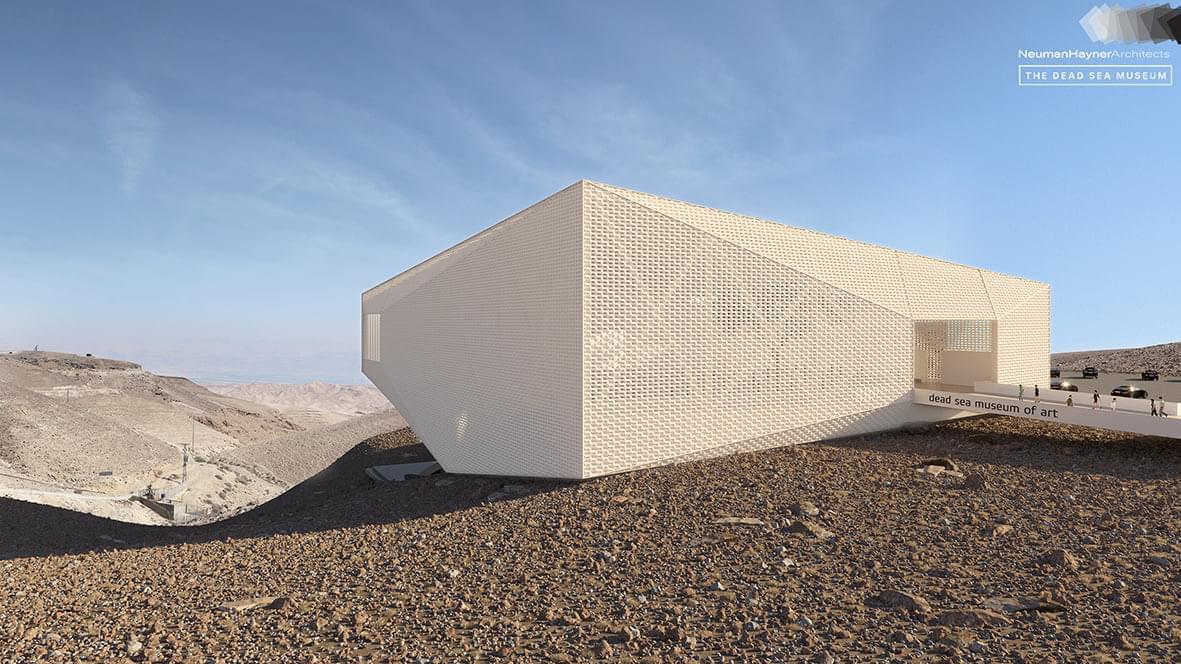
All the Spencer Tunick artwork until now is presented in the virtual museum, planned before any notion of Covid was in the air. The exhibition is on view through April 21, 2022 and can be visited from anywhere in the world.
Pushback against losing a natural wonder of the world
The exhibition contains photographs from 2011, 2012 and 2016, including never before seen photography from the Ein Gedi and Ein Bokek waterfalls where a group of 30 women participated.

The virtual exhibition consists of still photography, but also a video room, where a single-channel video is projected on the wall. Some well-known scenes come to life in this footage, bringing the visitor even closer to a long-gone natural environment that should still exist.
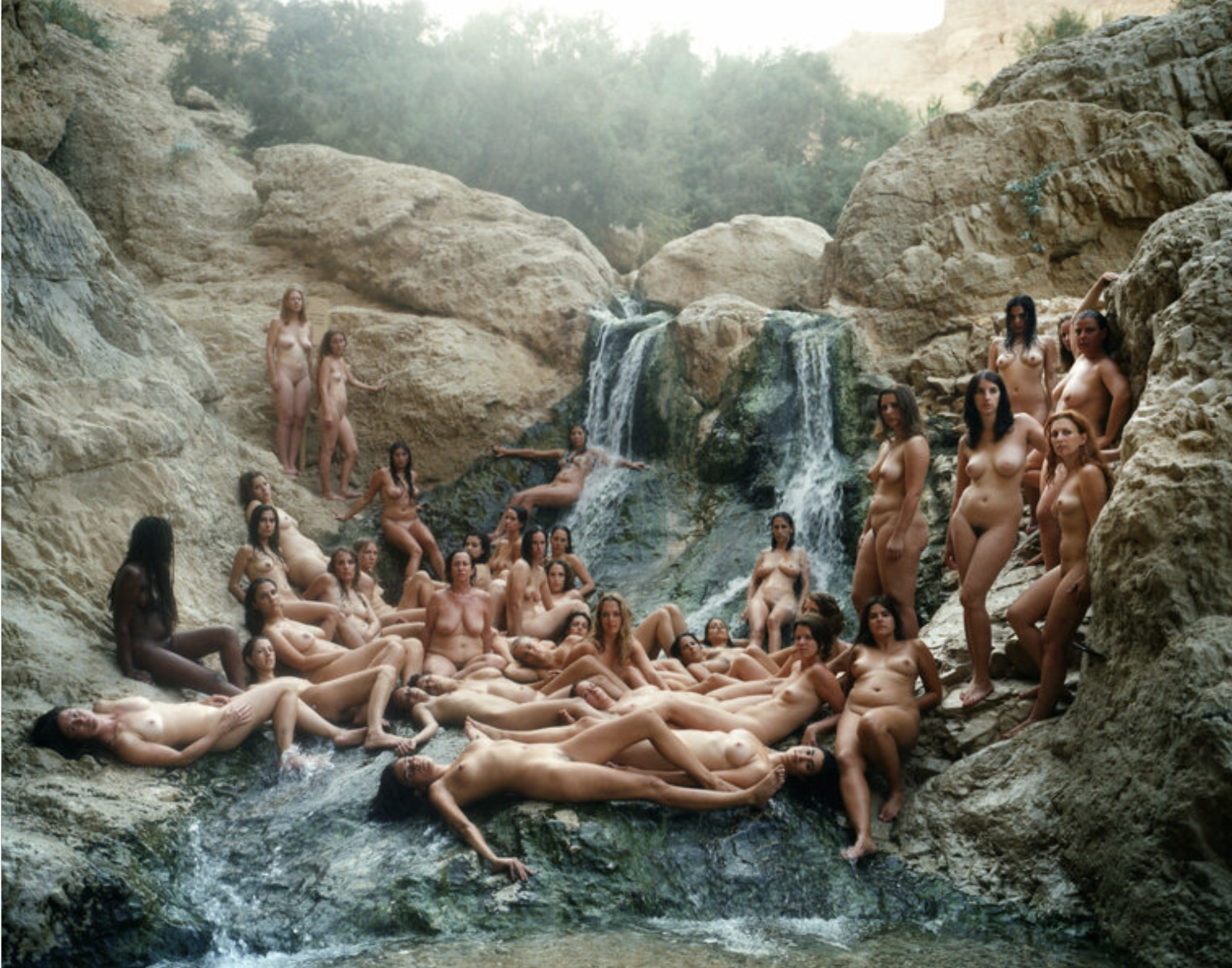
Ten years ago when Tunick created his first Dead Sea Installation his images captivated the world. Part of their appeal was an almost communal atmosphere; without clothes or any other artificial matter, the group of people transcends class, religion and nationality.
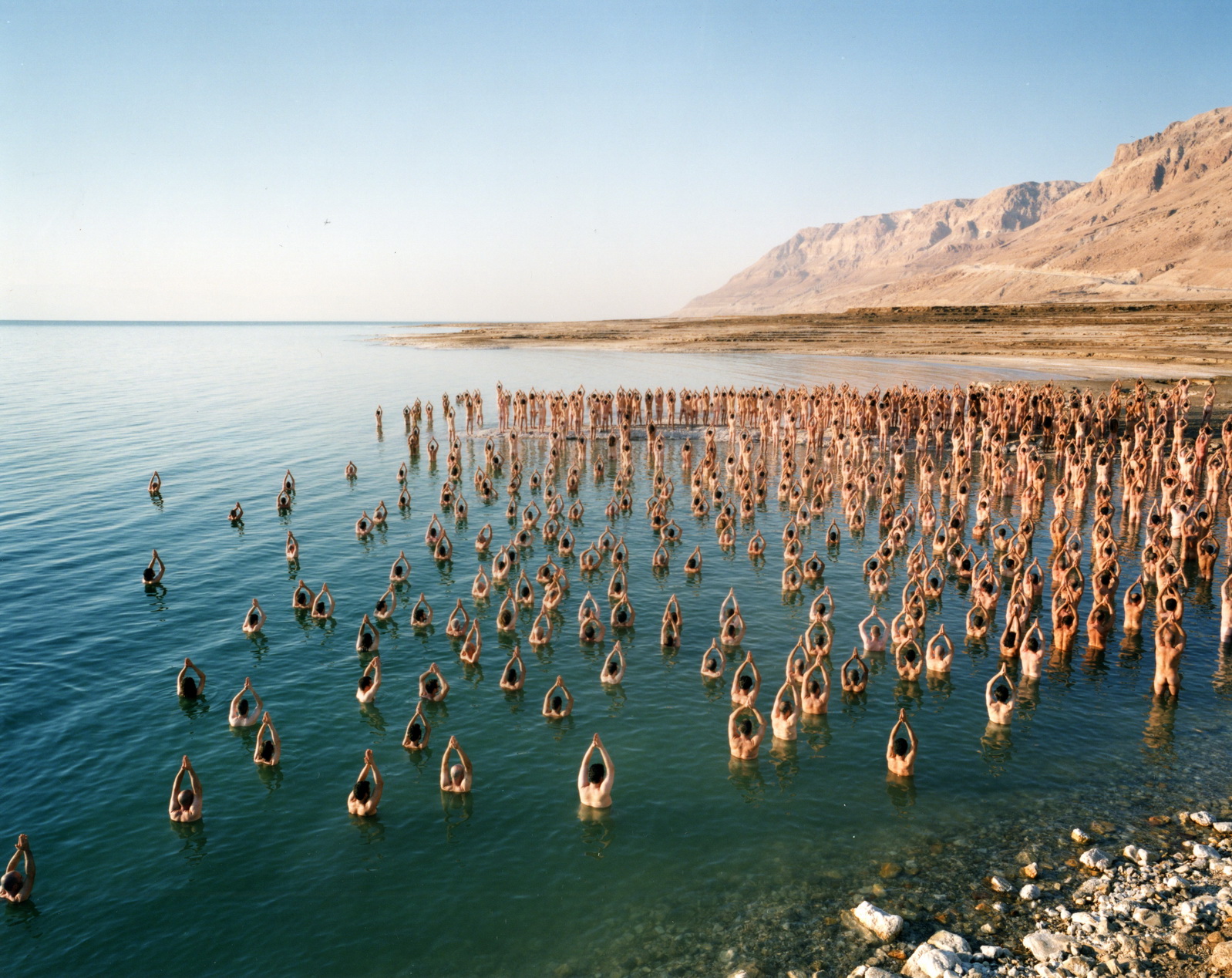
They simply appeared together in a moment in time, sharing an environment that welcomes their presence. A first glance at these images might invoke a Zen-like feeling, yet the harsh reality of the Dead Sea disappearing at a rapid pace is asking for a very different analysis. Knowing the urgency, one could also feel these people committed to a joined effort to protect the Dead Sea.
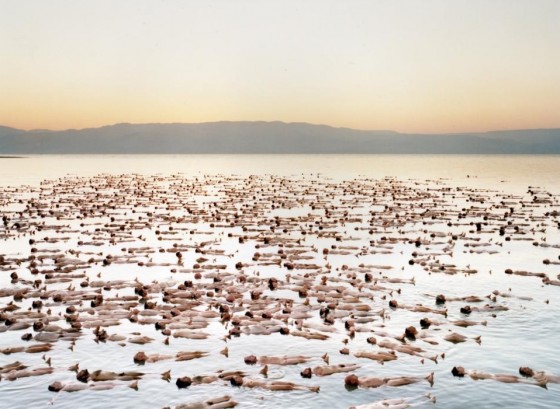
Now, time is of the essence, since the land and seascapes visible in these photographs are gone. Of course, the people in this installation moved on, too. They are a decade older; their bodies more seasoned, and their minds filled with ten additional years of experiences. Most still live, but way more alarming is that parts of the sea have perished.

Naked Dead Sea
The locations in Spencer Tunick’s original 2011 installation are now unrecognizable. The water has retreated and dangerous sinkholes have transformed Mineral Beach where the shoot was done and many other places in the region.
But the experience will show results, believes Fruchter. He tells Green Prophet: “What an incredible experience working with Spencer Tunick again in Israel for the 3rd time. In 2011 & 2016 our focus was on global awareness, hoping that the world would pay attention and do something for the Dead Sea.
“This time we came with our own plan to make a permanent change for the Dead Sea with design plans for a Dead Sea Museum in Arad. The city of Arad has embraced this and helped us produce the installation and have allocated 5.5 acres for the project, branding Arad as the gateway city to the Dead Sea.
“I was fortunate to find amazing partners to work with such as Nisan Ben Hamo, the Mayor of Arad, and Shani Senior Shiloa, the Director of the Arad Cultural Center, which helped ensure that the installation went off without any hurdles creating the best setting for Spencer Tunick and the participants to create incredible and breathtaking art together.”
Want to save the Dead Sea?
Mineral mining by the the Dead Sea Works on the Israel side, and Arab Potash on the Jordanian side, are widely known by environmentalists as the main cause for the destruction of the Dead Sea.
The companies also produce magnesium chloride, industrial salts, de-icers, bath salts, table salt, and raw materials for the cosmetic industry. The Dead Sea Works is a division of Israel Chemicals (ICL), by and large one of the most polluting companies in Israel. Arab Potash is now owned by Nutrien, a Canadian chemicals company trading on the New York Stock Exchange.
Potash, the mineral in question here, is a main fertilizer used in industrial agriculture. The main material we need for feeding the world. Another reason why we need to push for regenerative organic agriculture.
Earlier this year the State of Israel gave ICL even more leeway to destroy the Dead Sea, allowing the company to pump even more water than before:
“Additional millions of cubic meters will be awarded to the company over the coming years — subject to information the Water Authority has requested — to compensate for losses of water for reasons such as seepage through the floors of its evaporation pools and increasing salinity of the Dead Sea, which itself is partly a result of the commercial pumping.”
Part of the problem from the process at the Dead Sea is that rather than extracting the potash in mining, they use massive evaporation ponds. If you visit the Dead Sea in person the sight makes you want to cry. Below see how the evaporation pools have expanded from 1972 to 2011. About half of the Dead Sea has become an eyesore. It continues to retreat about a meter a year.
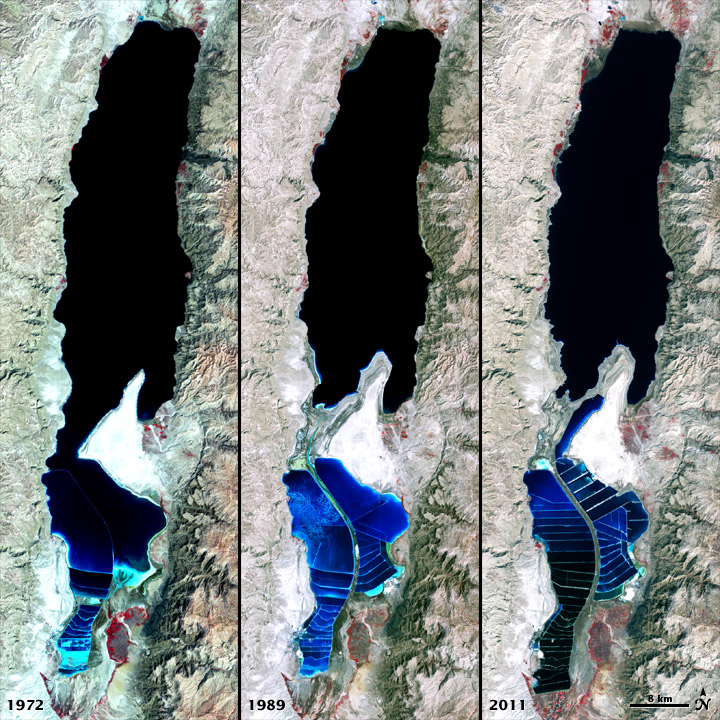
A brief history of Dead Sea profiteering
The Dead Sea was Cleopatra’s beauty secret, but the decision to start mining it for potash and destroying the world’s natural wonder may be blamed on the British.
Today who owns the Dead Sea looks confusing. When companies are bundled up in conglomerates it’s hard to know which actual companies and stakeholders are profiting from the Dead Sea destruction. A quick answer is ICL and Nutrien, based in Canada.
Already back in 1929, with British backing, the Dead Sea was estimated to be worth $4 billion pounds sterling, and an asset that “3 million Jews” settling the land should exploit, according to Sir Herbert Samuel, if they moved there under the British Mandate. That money could pay for the damages caused in the first world war, was his marketing pitch.
Under the British administration, concessions were given January 1, 1930, to extract salts and minerals in the Dead Sea.
On the surface of things, Israel and Jordan still share the land rights over the Dead Sea, which has been the biggest industrial site in the Middle East since the late 1920s. Dead Sea Works was founded by the State of Israel in 1952 as a state-owned enterprise. According to Wikipedia Dead Sea works extract 1.7 million tons of potash annually.
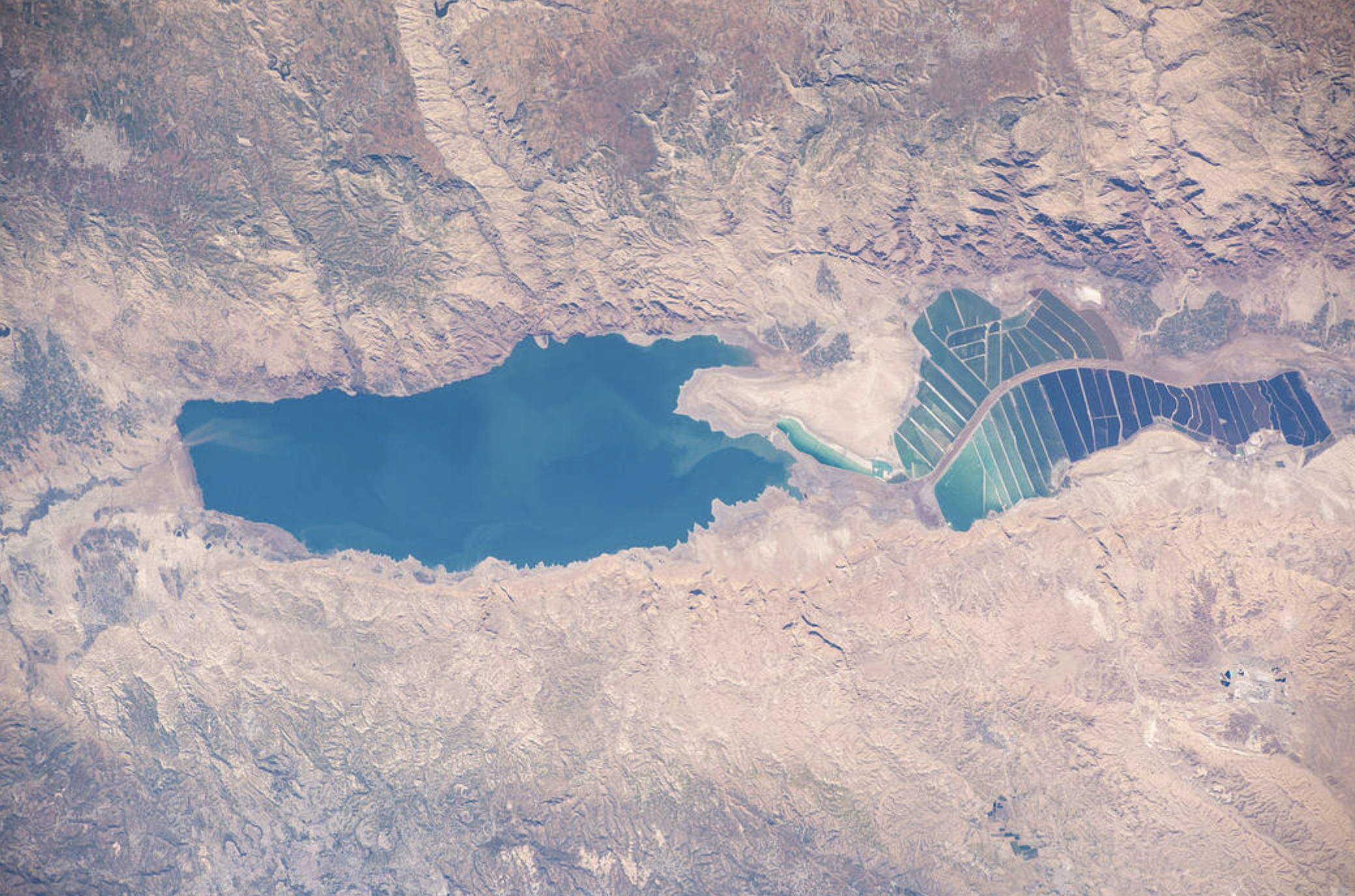
Arab Potash, owned by Jordan and formed in 1956 produces 2 million tons of potash. This company is now majorly owned by Nutrien, from Canada.
Both sides are equally destroying the Dead Sea but no doubt are partnered in a delicate political manoeuvre now involving multinational congomerates.
Who owns the Dead Sea today?
The short answer is Israel Corporation, owned by Idan Ofer, and Arab Potash, which is no longer a Jordanian company but controlled by a Canadian company called Nutrien trading on the Toronto and New York stock exchanges. So if you want to lobby, fight for environmental justice, scream, petition, or get naked: these are the top level stakeholders. Israelis living in London and New York, possibly Monaco, and on a yacht somewhere, and a multinational company trading out of Toronto and the Big Apple.
And this is why environmental protection is so hard to do at the local level.
But we will break it down a bit more if you want to dig deeper. Because we trust there will be some next-level environmental geeks reading this.
Israel and the Dead Sea
Israel Corporation
Israel’s largest holding company. Its holdings are fertilizers and specialty chemicals, energy, shipping and transportation. Israel Corp trades on the Tel Aviv Stock Exchange. It owns Israel Chemicals (now ICL Group),Oil Refineries Ltd, Tower Semiconductor, Kenon Holdings and Zim Integrated Shipping Services. A majority stake, 55%, is owned by a private family, The Ofer Family. The rest 18% is owned by a bank and the remaining is traded publicly.
ICL Group
ICL owns the Dead Sea Works. It greenwashes its operations at the Dead Sea by saying its company the Dead Sea Works is creating a salt wall, a “circular economy” in accordance with nature protection. It uses wording on its website like “sustainable agriculture:.
Jordan and the Dead Sea
Arab Potash is just as responsible for Dead Sea destruction as Israel. The Arab Potash Company (APC) is a company that is primarily involved in harvesting minerals from the Dead Sea. It is the eighth largest potash producer worldwide by volume of production and the sole Arab producer of potash.
The company was formed in 1956 in the Hashemite Kingdom of Jordan as a pan-Arab business venture and it has a 100-year concession (1958-2058) from the government of Jordan that grants it exclusive rights to extract, manufacture and market minerals from the Dead Sea.
It is headquartered in Amman and has its main plants at Ghor Al Safi. The company’s stock is listed on the Amman Stock Exchange’s ASE Weighted Index. It sold its major shares to a company in Canada that merged with another company, making it impossible to really see who owns anything anymore. But we did some tracing.
Canada and the Dead Sea
There was rumor a few years ago that Canada’s Potash Corporation of Saskatchewan (which later merged to Nutrien trading on the Toronto Stock Exchange) wanted to buy the Dead Sea Works. The deal didn’t go through. But PotashCorp (now Nutrien) holds nearly 27.7 percent, but a controlling stake of Arab Potash; the Jordanian government, through the Jordan Investment Corporation, holds more than 26.8 percent, and the Arab Mining Company, which holds more than 19.5 percent.
According to Simply WallStreet institutional investors own over 50% of Nutrien, so together than can probably strongly influence board decisions. First Eagle Investment Management, LLC owned by Blackstone is currently the largest shareholder in Nutrien, with 3.5% of shares.
Nutrien offers an impressive ESG report. No mention of the Dead Sea in the extensive PDF. If it goes offline you can download it here (ESG Report 2021-NUTRIEN 2). Nurtien is now, thanks to the Dead Sea, and recent mergers in the last few years, the largest potash supplier on the planet.
China and the Dead Sea
Ahava, a beauty products company was sold in a majority stake deal to China company Fosun for about $76 million USD is a player in mineral mining for the beauty industry. The company was stalked by the BDS movement so it sold to China to avoid the backlash. It is the only company with commercial rights to harvest mud from the Dead Sea. You can find their products in Walmart.
____
We know you came here for “naked” and not necessarily saving the Dead Sea. So…
More on the Naked Dead Sea project:
Why I got Naked for the Dead Sea
Strip Naked for the Dead Sea
A Thousand Israelis Get Naked for the Dead Sea
New Life Found in the Dead Sea

